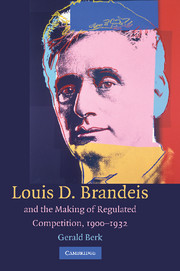Book contents
- Frontmatter
- Contents
- Figures and Tables
- Acknowledgments
- 1 Creative Syncretism
- PART I BRANDEIS AND THE THEORY OF REGULATED COMPETITION
- PART II REGULATED COMPETITION IN PRACTICE
- PART III REGULATED COMPETITION CONTESTED
- PART IV CONCLUSION
- 9 Civic Enterprise
- Appendix Industries and Number of Associations with at Least Substantial Involvement in Developmental Association, by Industry Group
- Index
9 - Civic Enterprise
Published online by Cambridge University Press: 23 November 2009
- Frontmatter
- Contents
- Figures and Tables
- Acknowledgments
- 1 Creative Syncretism
- PART I BRANDEIS AND THE THEORY OF REGULATED COMPETITION
- PART II REGULATED COMPETITION IN PRACTICE
- PART III REGULATED COMPETITION CONTESTED
- PART IV CONCLUSION
- 9 Civic Enterprise
- Appendix Industries and Number of Associations with at Least Substantial Involvement in Developmental Association, by Industry Group
- Index
Summary
The builders of regulated competition created a new path to economic and political development, which successfully combined America's traditional aspiration to equality with modern management. Brandeis enhanced the cultural debate over industrial society during the election of 1912 by combining republican commitments to equality with progressive aspirations to mastery in the ideology of republican experimentalism. He devised a theory of regulated competition, which showed how business, trade associations, and government could work together to channel business rivalry from predation to improvement. And he drew on his experience in railroad and utility regulation to outline a blueprint for a cultivational commission devoted to regulating competition. In 1914, creative legislators combined the features of progressive, populist, and Brandeisian proposals for a federal trade commission and they forged a legislative majority by interpreting their work through multiple frames. The Federal Trade Commission Act of 1914 became law with multiple meanings that licensed numerous projects, including regulated competition. Creative administrators at the FTC cultivated experimental and deliberative capacities in peak, professional, and trade associations through two programs: cost accounting and trade practice conferences. Their efforts bore fruit. The U.S. Chamber of Commerce conducted a forum to conceptualize developmental trade associations. The National Association of Cost Accountants built an association devoted to information exchange and collaborative learning. And with the help of the FTC, the U.S. Chamber, and the cost accountants, 15 percent of trade associations in 25 percent of U.S. manufacturers transformed themselves from cartels into developmental associations.
- Type
- Chapter
- Information
- Publisher: Cambridge University PressPrint publication year: 2009



